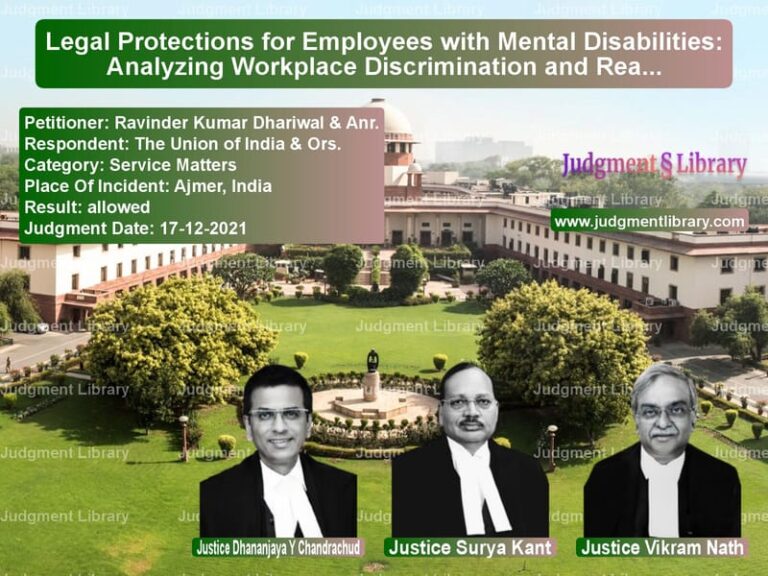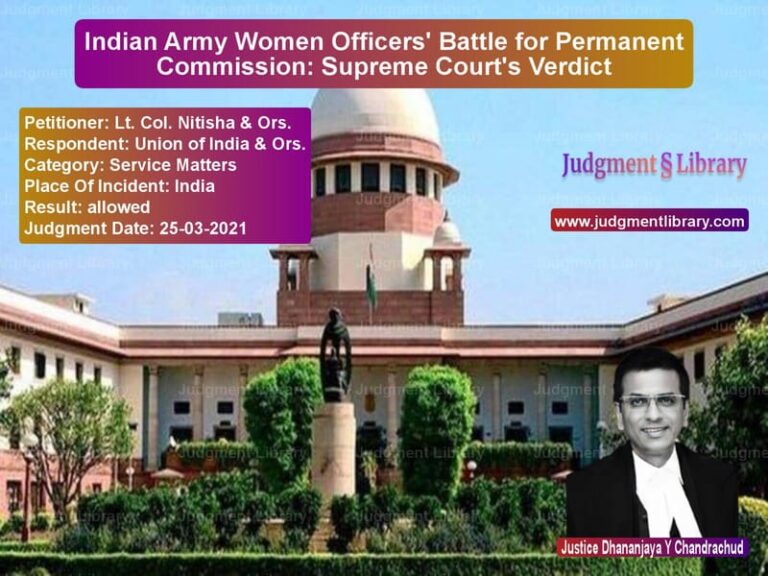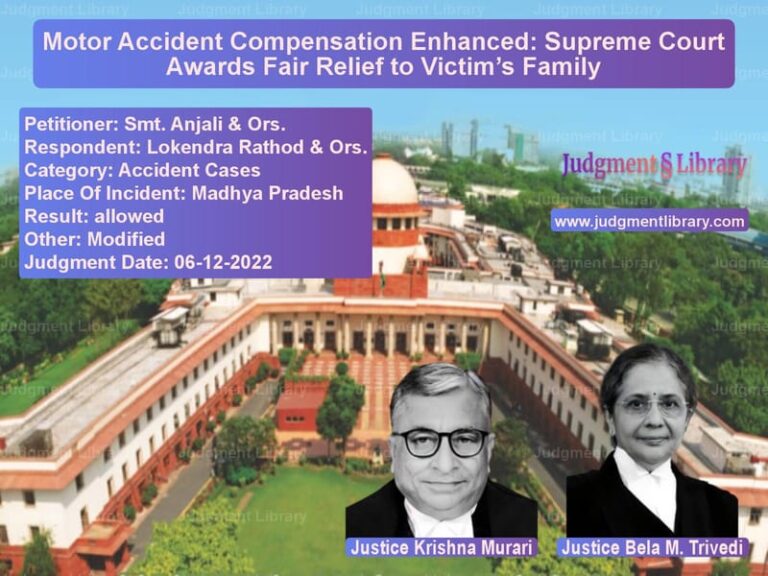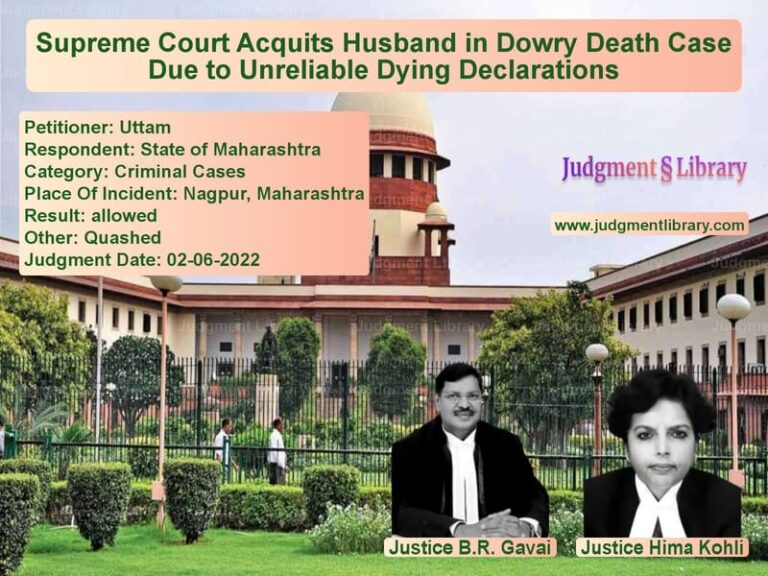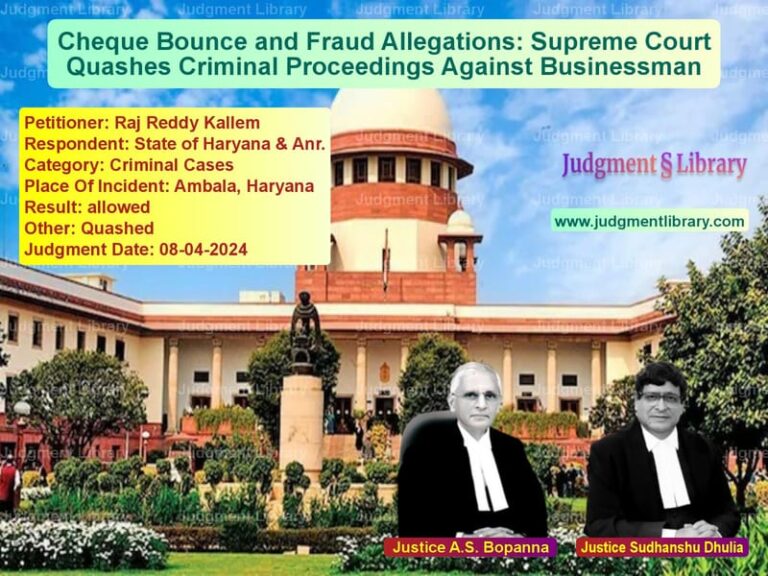Supreme Court Directs Government to Improve Nurses’ Working Conditions in Private Hospitals
The Supreme Court of India, in the case of Trained Nurses Association of India v. Union of India & Ors. (Writ Petition (C) No. 527 of 2011), addressed the grievances of nurses working in private hospitals and nursing homes. The petitioner association sought judicial intervention to improve service conditions, ensure fair wages, and eliminate the practice of requiring nurses to sign employment bonds.
Background of the Case
The Trained Nurses Association of India filed a writ petition before the Supreme Court, raising concerns about the exploitative conditions in which nurses in private hospitals and nursing homes were working. The petition highlighted issues such as low wages, long working hours, lack of proper leave policies, and the coercive practice of employment bonds.
Reliefs Sought by the Petitioners
The petitioners made the following requests:
- Issuance of guidelines to improve working conditions of nurses in private hospitals and nursing homes.
- Directions to all respondents (Union of India, Indian Nursing Council, and State Governments) to adhere to the Court’s guidelines until legislative measures are enacted.
- Equal pay for nurses in private hospitals, comparable to nurses in government hospitals.
- Strict action against private hospitals and nursing homes requiring nurses to sign employment bonds.
- A declaration that the bond system practiced by private hospitals is unconstitutional and illegal.
- A directive to the Central Government to formulate specific guidelines to improve the service conditions of nurses.
Arguments by the Petitioners
The Trained Nurses Association of India, through its counsel, presented the following arguments:
- Nurses in private healthcare facilities work under conditions that violate their fundamental rights under Article 21 (Right to Life and Dignity) of the Constitution.
- The wages of nurses in private institutions are disproportionately low when compared to those in government hospitals, violating the principle of equal pay for equal work.
- The practice of compelling nurses to sign employment bonds, which require them to work under predefined conditions for fixed periods, amounts to forced labor.
- The Central Government and State Governments have failed in their duty to regulate and monitor the working conditions of nurses in private healthcare establishments.
Arguments by the Respondents
The Union of India and other respondents, including the Indian Nursing Council, presented the following arguments:
- Healthcare falls under the concurrent list, and therefore, both the Central and State Governments have responsibilities in ensuring fair working conditions.
- The regulation of wages in private hospitals falls under labor laws, and independent mechanisms already exist for dispute resolution.
- The Central Government acknowledged the issue and assured the Court that a Committee would be formed to examine the concerns raised by the petitioner association.
- The Indian Nursing Council submitted that the system of employment bonds had already been abolished.
Supreme Court’s Observations
The Supreme Court bench, comprising Justices Anil R. Dave, Shiva Kirti Singh, and Adarsh Kumar Goel, made the following key observations:
- The Court acknowledged that nurses working in private hospitals and nursing homes were not being treated fairly in terms of wages and service conditions.
- The issues raised in the petition required legislative and executive intervention rather than judicially framed guidelines.
- The formation of a Committee by the Central Government was necessary to assess the working conditions of nurses in private healthcare institutions.
- The recommendations of this Committee should lead to legislative measures by either the Parliament or State Legislatures.
Directions Issued by the Supreme Court
The Court issued the following directives:
- The Central Government must constitute a Committee within four months from the date of the judgment to investigate and recommend measures for improving the working conditions of nurses in private hospitals.
- The Committee, after conducting its study, must submit its report within six months of its formation.
- The recommendations should be considered by the Central Government, and necessary steps should be taken to ensure their implementation.
- The Union of India must ensure that either Parliament or the respective State Governments enact suitable legislation to protect nurses’ rights.
- The Court noted that the employment bond system had already been abolished and, therefore, no specific relief was needed on that issue.
Impact of the Judgment
1. Strengthening Nurses’ Rights
This judgment acknowledges the hardships faced by nurses in private hospitals and nursing homes and ensures that their concerns are addressed through legislative action.
2. Uniformity in Wages
The Supreme Court’s directions, if implemented effectively, could result in fair and uniform wages for nurses across private and public sectors.
3. Improved Regulatory Oversight
The Court’s emphasis on government intervention will lead to stricter regulations for private healthcare institutions regarding service conditions and salary structures.
4. Recognition of Healthcare Workers’ Contribution
The case highlights the essential role of nurses in the healthcare system and the need to recognize their contributions through fair compensation and better working environments.
Conclusion
The Supreme Court’s ruling in Trained Nurses Association of India v. Union of India & Ors. is a crucial step towards addressing the long-standing issues faced by nurses in private hospitals. By directing the Central Government to constitute a Committee and take legislative action, the Court has laid the groundwork for meaningful reforms in the nursing profession. If implemented correctly, these measures will not only improve the welfare of nurses but also enhance the overall quality of healthcare in India.
Don’t miss out on the full details! Download the complete judgment in PDF format below and gain valuable insights instantly!
Download Judgment: Trained Nurses Assoc vs Union of India & Ors Supreme Court of India Judgment Dated 29-01-2016.pdf
Direct Downlaod Judgment: Direct downlaod this Judgment
See all petitions in Employment Disputes
See all petitions in Recruitment Policies
See all petitions in Public Sector Employees
See all petitions in Judgment by Anil R. Dave
See all petitions in Judgment by Shiva Kirti Singh
See all petitions in Judgment by Adarsh Kumar Goel
See all petitions in allowed
See all petitions in supreme court of India judgments January 2016
See all petitions in 2016 judgments
See all posts in Service Matters Category
See all allowed petitions in Service Matters Category
See all Dismissed petitions in Service Matters Category
See all partially allowed petitions in Service Matters Category


